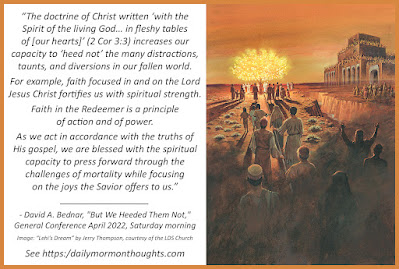"The word heed suggests taking notice of or paying attention to someone or something. Thus, the lyrics of the hymn 'Let Us All Press On' admonish us to make an affirmative decision to pay no attention to 'what the wicked may say.' And Lehi and the people with him who were partaking of the fruit of the tree provide a strong example of not paying attention to the mocking and scorn that so frequently come from the great and spacious building."The doctrine of Christ written 'with the Spirit of the living God … in fleshy tables of [our hearts]' (2 Cor 3:3) increases our capacity to 'heed not' the many distractions, taunts, and diversions in our fallen world. For example, faith focused in and on the Lord Jesus Christ fortifies us with spiritual strength. Faith in the Redeemer is a principle of action and of power. As we act in accordance with the truths of His gospel, we are blessed with the spiritual capacity to press forward through the challenges of mortality while focusing on the joys the Savior offers to us. Truly, 'if we do what’s right we have no need to fear, for the Lord, our helper, will ever be near' (Hymns 243)."- David A. Bednar, "But We Heeded Them Not," General Conference April 2022, Saturday morningClick here to read or listen to the full discourse
Elder Bednar used the phrase from "Let Us All Press On" to set the theme for his talk: "We will heed not what the wicked may say, but the Lord alone we will obey." Learning not to heed the world when it mocks from the "great and spacious building," or when it tempts from the depths of darkness, is the key to staying on the path that leads to our source of happiness.
The great key to this message, for me, was the thought that to fully be able to "heed not" one thing, we have to have a clear focus on what we do heed. The best way to take our focus away from the world is to have some other thing that we focus it on. If we are not heeding what the world says, it is because "the Lord alone we will obey." Our focus has to be on Him. As we do that, it becomes easy to ignore the negative aspects of the world around us.
(Compilation and commentary by David Kenison, Orem, Utah, 2022)
































